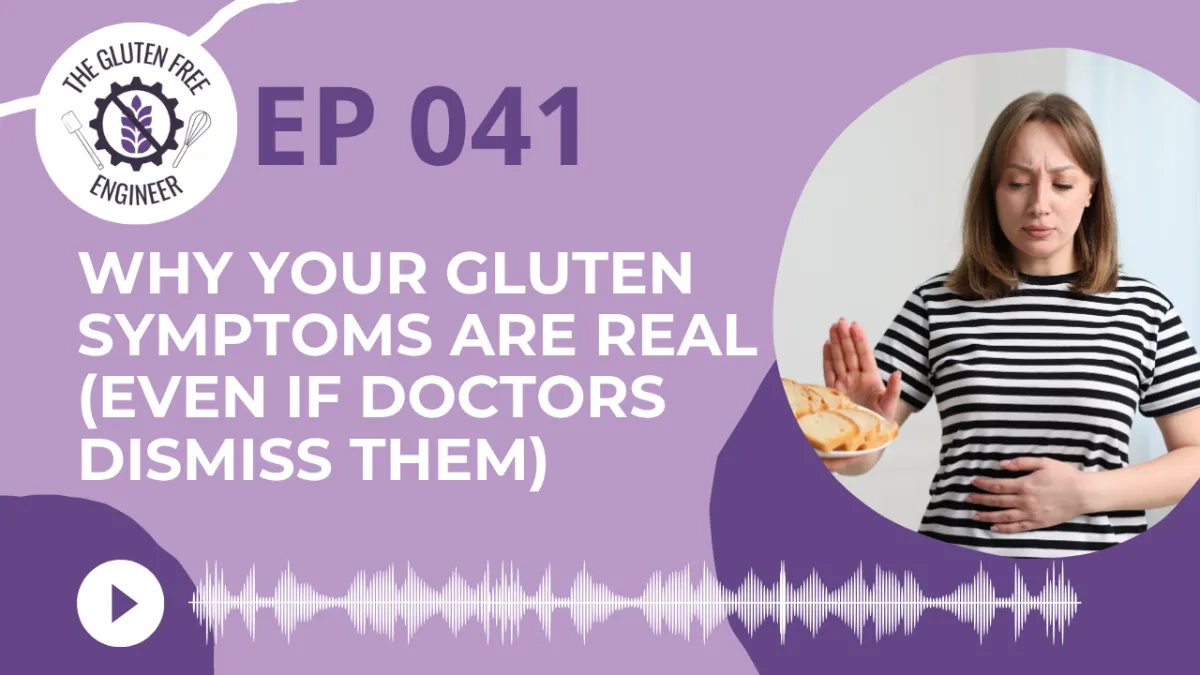
#41: Why Your Gluten Symptoms Are Real (Even if Doctors Dismiss Them)
Have you ever been told your gluten symptoms are all in your head? Maybe a doctor brushed them off, or friends and family made you feel dramatic for needing to eat gluten-free.
I want you to know this: you’re not crazy, and your symptoms are real.
In today’s episode, I’ll share why gluten can cause so many different symptoms, why doctors sometimes dismiss them, and how to trust your body even when others don’t. Stick with me until the end, because I’ll share a simple way to advocate for yourself at the doctor’s office without feeling like you’re being difficult.
Let's Recap: Why Your Gluten Symptoms Are Real
When you experience symptoms after eating gluten but doctors or friends dismiss them as “all in your head,” it can be incredibly frustrating and isolating. This dismissal of real physical suffering is something I’ve experienced firsthand, and it’s why I’m passionate about validating others on their gluten-free journey.
The reality is that gluten reactions are scientifically proven and can affect far more than just your digestive system.
The Truth About Gluten Reactions
Gluten, a protein found in wheat, barley, and rye, can trigger powerful immune responses in those with celiac disease or non-celiac gluten sensitivity. This isn’t imaginary—it’s your body launching a real biological defense.
What many people don’t realize is how widespread these reactions can be. Beyond the classic digestive symptoms, gluten can affect:
Your brain, causing brain fog or migraines
Your skin, causing rashes like dermatitis herpetiformis
Your joints, leading to inflammation and pain
Your reproductive system, potentially contributing to fertility issues
The scientific evidence for these varied symptoms continues to grow, yet many medical professionals haven’t caught up with the research.
Why Doctors Sometimes Dismiss Symptoms
Medical training has traditionally focused on the “classic” presentation of celiac disease: chronic diarrhea, weight loss, and malnutrition. However, many patients present with “atypical” symptoms that don’t fit this narrow definition.
Additionally, medical schools often provide limited nutrition education, leaving many doctors ill-equipped to recognize the connection between food and various symptoms. Perhaps most frustratingly, Irritable Bowel Syndrome (IBS) is frequently used as a catch-all diagnosis when doctors aren’t sure what’s causing digestive distress.
As I share in my podcast, I was diagnosed with IBS for nearly a decade before finally getting my celiac diagnosis—a delay that impacted my health significantly, including during my third pregnancy.
Becoming Your Own Health Detective
The path to validation often requires becoming your own health detective. I discovered my gluten sensitivity by keeping a detailed food journal and noticing that my Friday “cheat meal” (a gluten-filled sandwich) was consistently followed by symptoms that lasted all weekend, with relief only coming after several days of eating gluten-free.
This clear pattern gave me the confidence to pursue proper testing, even when doctors were skeptical.
If you suspect gluten might be causing your symptoms, start documenting everything:
What you eat
When symptoms appear
How long they last
How severe they are
This concrete evidence can shift the conversation with healthcare providers and provide clarity for yourself.
Advocating for Yourself
Self-advocacy in the medical system is essential, especially when dealing with conditions that can manifest in different ways.
Request a full celiac panel (not just one test, which can miss cases), bring family history information (celiac has a strong genetic component), and don’t hesitate to seek second or third opinions if you’re not getting answers.
Remember—you know your body better than anyone else. Persistent symptoms are your body’s way of signaling that something isn’t right. Trust those signals, even when others doubt them.
Finding Validation and Healing
Finally understanding what’s happening in your body can be life-changing. After years of unexplained symptoms, discovering that gluten was the culprit in my case led to tremendous healing—physically and emotionally.
It also helped me recognize signs in my children, allowing them to get diagnosed earlier than I was.
Whether you have celiac disease, non-celiac gluten sensitivity, or another food-related condition, your symptoms are real, your experience is valid, and you deserve proper care and understanding.
The journey to diagnosis might be challenging, but trusting your body and advocating for yourself can lead to the answers and relief you’ve been seeking.
